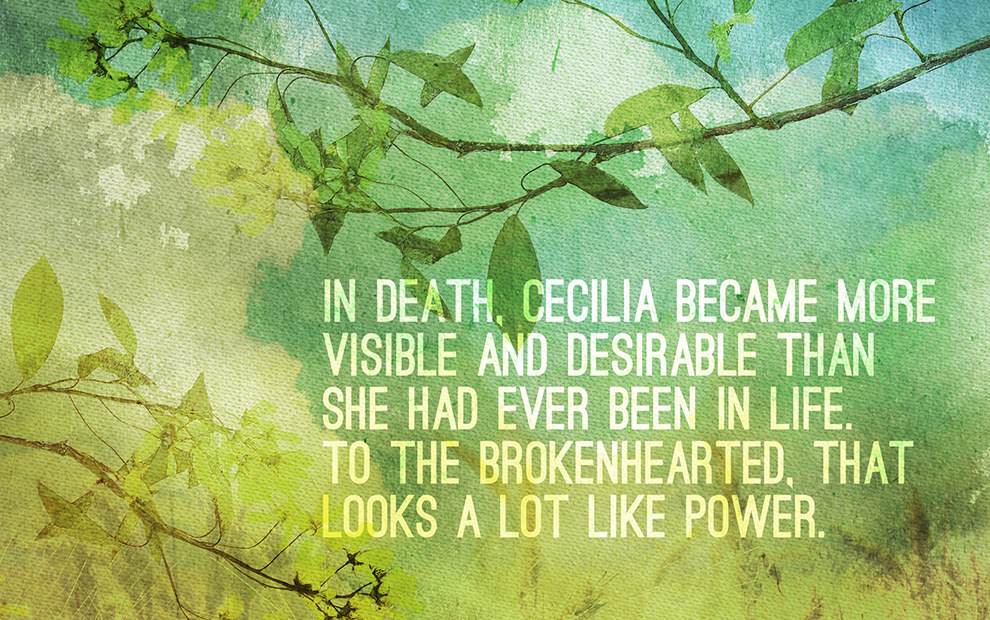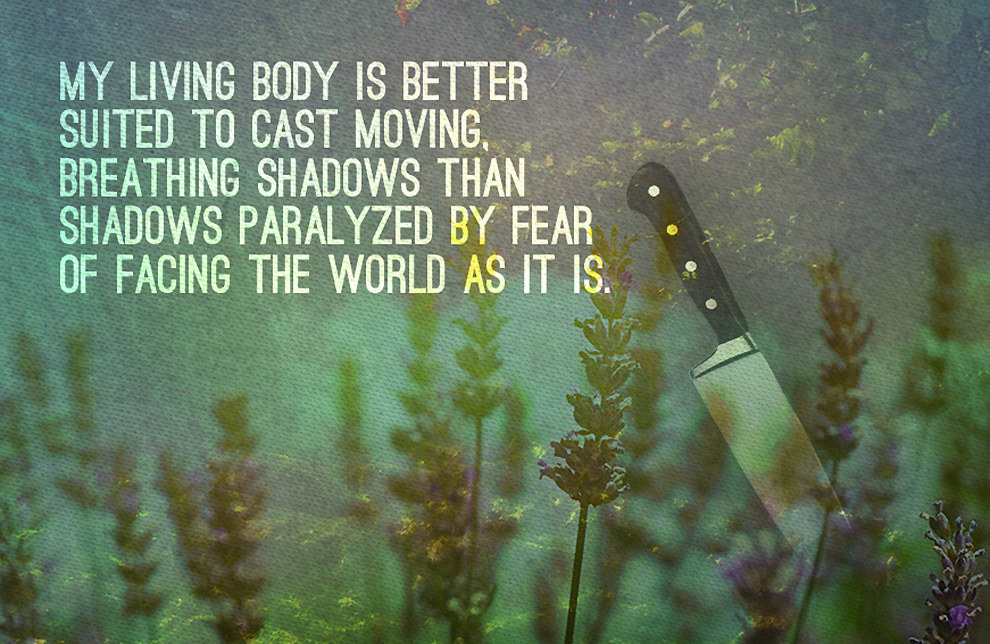
There exists a photo of me as a teenager kneeling on my friend's living room floor wearing a white nightgown, holding a kitchen knife with the sharp end halfway in my mouth. A coral bra is visible under the nightgown and I look into the camera trying to be both provocative and frightening, but not managing to pull off either one entirely. I was at a The Virgin Suicides–themed party, one of many offbeat parties my friends and I would host in our late teens, each theme an attempt to one-up our last party's strangeness. It was a time when I was both a virgin and, for the first time in my life, suicidal.
While I spent my entire childhood entertaining generally self-destructive thoughts, this was a decided turn from thoughts to impulses. Hypothetical escape routes from my life emerged in my mind as I entered the early phases of adulthood. Peculiarly, my literary fascinations regressed from the melancholy adult women I had admired as a child to a very particular kind of suicidal teenage girl. While literature is awash in young women who end their own lives in dramatic final chapters, my preoccupation was with girls who committed suicide early on in their respective stories. To end one's life at the end of a story is usually because all other options have been exhausted. To commit suicide in the beginning or the middle of a story was to radically refuse to participate in the narrative as anything but a ghost. There was something familiar about wanting to haunt a story rather than tell it.

My first fixation on this character type was Cecilia, the youngest of the five Lisbon sisters in Jeffrey Eugenides' The Virgin Suicides. Though the book brims with dark moments, there was something especially enticing about a 13-year-old that only successfully commits suicide when she tries a second time. Because suicide is often attempted by young women but most often completed by men of middle age, there was a decidedly grim adult conviction to her suicide. When Cecilia succeeds in ending her life with the assistance of an open window and an iron fence, it means that she meant it all along. In the sickness of suicidal ideation that was only beginning to wander to that place, I saw a resoluteness in Cecilia's despair at the world that I lacked. As the mind betrays itself so cruelly, there is a brutal kind of comfort in comparing yourself to a child who is better at misery than you.
My fascination with Cecilia extended beyond what I saw as the courage of her convictions. Her suicide made her an object of infatuation by the neighborhood boys who narrate The Virgin Suicides, their affections brought to the surface in the pain of her death. "A few of us had fallen in love with her, but had kept it to ourselves, knowing that she was the weird sister," they note, examining contraband and collecting intel from neighborhood girls about the state of the Lisbon household. I was an emotionally vulnerable teenager who had never experienced romantic love and was convinced that the other abundant love I had was hemorrhaging from my life in response to my imaginary failings. Talking me out of feeling that I was physically repulsive and morally bankrupt was as fruitless as trying to get a color-blind person to just see that a rose is red. But in the solitude of such self-reflection, I wanted to be visible too. To be a viscerally present specter like Cecilia seemed to be an upgrade. The narrators recall:
Poor Cecilia appeared in our consciousness at odd moments, most often as we were just waking up, or staring out a car-pool window streaked with rain—she rose up in her wedding dress, muddy with the afterlife, but then a horn would honk, or our radio alarms would unleash a popular song, and we snapped back to reality.
In death, Cecilia became more visible and desirable than she had ever been in life. Her suicide triggers the decline of her entire household, complete with dying trees in the yard and sisters going mad with despair upstairs. To the brokenhearted, that looks a lot like power.

The Bridge on the Drina is an unequivocally different sort of story. I read it as a college student after discovering that Serbian fiction is one of the best destinations for existential suffering beautifully told. It is not a book about girls or suicide or even about any particular character besides the ancient bridge for which the book is named and the nearly 400 years of tragic Balkan history that traveled back and forth across it. The Nobel Prize–winning novel is truly epic, not in the exhausted sense of that word we've developed a habit of using as a descriptor for the clever or outlandish, but in the sense of a sprawling story of rises and falls. It is nestled within this tome that I encountered Fata, the only daughter of Avdaga.
Fata's beauty and cleverness made her a source of fascination early in her life, but of scorn as she declined suitor after suitor as she grew older and swore to never be a young bride: "And when they had all been rejected, a sort of vacuum was created about Fata, an enchanted circle, made of hatred and envy, of unacknowledged desires and of malicious expectation, such a circle as always surrounds beings with exceptional gifts and an exceptional destiny." Superficially, Fata was precisely the kind of girl that Cecilia was not, but they shared an admirably stubborn refusal to accept the world as they had inherited it.
When Fata's beloved father promises her hand in marriage, she is faced with the decision to either break her word to never make the trek from her home to that of her intended, or to publicly reject the wishes of her father. When Fata's father has a coughing fit late one night, Andrić writes:
She felt that heavy shattering cough as if it had been in her own breast. In truth, it had been that mouth that had said yes where her own had said no. But she was at one with him in this and everything, even in this. That yes of his she felt as if it were her own (even as she felt too her own no.) Therefore her fate was cruel, unusual, immediate, and therefore she saw no escape from it, for none existed.
And so en route to her own wedding, Fata throws herself from the bridge into the river which then "rose and grew angry," flooding the banks and washing her body ashore in the next town. Whether nature was disturbed at her action or the failure of the town to prevent it is not entirely clear. What is clear from the narrative is that her death shook the foundations of the town from which she came, her indelible mark left on the bridge like footprints that storms and war could not wash away. Though she does not appear as a phantom so literally as Cecilia, she haunted the rest of the story for me. At each instance in the narrative where atrocities unfolded as the results of war and empire, it felt as if she had purposely declined a place in the broken future of her home country. For people who feel that their life is without meaning, purpose, or conviction, to have something worth dying for becomes a source of as much envy as beauty.
As I've surpassed the decade mark of encountering suicidal thoughts and learned ways of approaching these thoughts in ways meant to destroy them, my affection for the artfulness of these stories has not waned. But my preoccupation for the dead girls that lie restless within them has dissipated as I've come to recognize the logical fallacy at its center. The very things I found aspirational about their deaths were precisely what I would never have were I to succumb to suicidal impulses. While my self-destructive impulses have not disappeared entirely, I have learned to redirect them to searches for love among the real and living rather than commiseration with the fictional and dead.
The narrators of The Virgin Suicides reflect, "We knew that Cecilia had killed herself because she was a misfit, because the beyond called to her, and we knew that her sisters, once abandoned, felt her calling from that place, too." As an adult, I realize that boys infatuated with girls actually know very little of their interior lives. Indeed, it is precisely that deficit in understanding that is the source of so much youthful female anguish. They might have thought about her affectionately in her death, but their ruminations were about Cecilia's shadow more than they were about a real girl who died.
And while I was engrossed by the thought of having Fata's exceptional conviction in addition to her exceptional wit and beauty, it made me willfully ignorant of the fate that such gifts often predict. "Such persons, of whom much is said and sung, are rapidly borne away by that especial destiny of theirs and leave behind them, instead of a life fulfilled, a song or a story," Andrić writes of her, a warning to those that aspire to be compelling human tropes rather than broken but living human realities. To be a haunting song is only a desirable fate if you live to hear it sung.

I occasionally revisit these girls whose brokenheartedness drew them to edges from which they could not return. Their youth is trapped in amber, possessing a beauty and mystery to which I cannot return. But they are trapped and I am not. And it is when I realize this that my living body is better suited to cast moving, breathing shadows than shadows paralyzed by a fear of facing the world as it is. It is then that I can be glad for the girl that only put the knife halfway into her mouth. I can embrace that there is beauty and mystery to growing older. And I can be perfectly content that there is more to life than pulling either off entirely.
